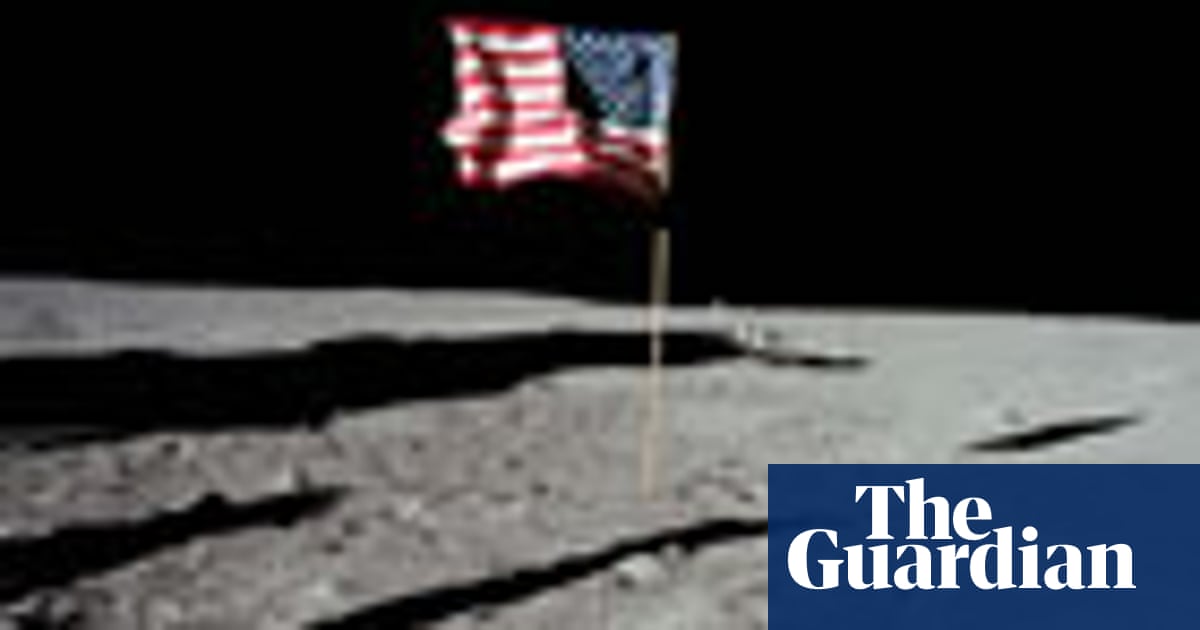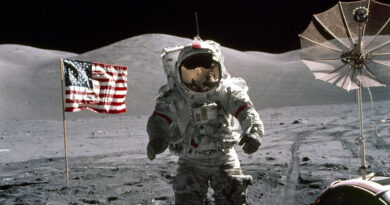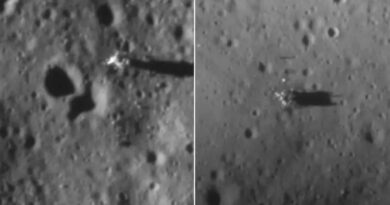Those hoax myths debunked

The fluttering flag
Claim: The planted US flag waves in the wind, which is impossible without an atmosphere.
Why it’s nonsense: The flag doesn’t move in any of the videos except when touched by Neil Armstrong or Buzz Aldrin. But then the lack of atmosphere and friction stops it settling quickly, as it would on Earth. “If it moved it would have kept moving. No wind is needed,” says Doug Millard at the Science Museum in London.
The shifty shadows
Claim: Pictures show shadows cast by objects on the surface at different angles. There must have been multiple light sources, such as in a TV studio.
Why it’s nonsense: A low sun and uneven surface can distort the angles of shadows in images. But if there were multiple light sources, why does each object cast only one shadow? “The moon is an alien place and people who raise these questions simply aren’t in a position to comment about what we should expect there,” Millard says. “Only 12 guys have been there and know this stuff for real.”
The phantom photographers
Claim: Images taken of astronauts arriving on the moon and blasting off again would need someone else there with a camera.
Why it’s nonsense: Armstrong’s small step was shot by a camera mounted on the outside of the Eagle lander. Still photos of his arrival taken from further away are actually of Aldrin, snapped by Armstrong. Remote cameras left on the moon could easily track departures.
The killer radiation
Claim: Apollo astronauts could not have travelled to the moon as a giant belt of lethal space radiation would have frazzled them.
Why it’s nonsense: These so called Van Allen belts, where the Earth’s magnetic field collects solar radiation, would be dangerous only if people were to hang out there for several days. The astronauts whizzed through in a matter of hours, and received a radiation dose similar to an X-ray. “You can pass through quite safely as long as you don’t linger too long,” Millard says.
The missing flame
Claim: There was no exhaust flame from the lunar module when it blasted back off the moon. Therefore, it was a model pulled up on a wire.
Why it’s nonsense: The Saturn V rocket burnt liquid oxygen and kerosene on blast-off, which provides a fiery plume. The lunar lander ran on nitrogen tetroxide and Aerozine 50, which doesn’t. Its exhaust gases were transparent.
The absent stars
Claim: Space is full of stars, so why do they not appear in photographs taken on the moon?
Why it’s nonsense: The astronauts took pictures of brightly lit, shiny white objects. In these conditions, cameras need a fast exposure time and small aperture, making it impossible to capture faint background objects. Guardian photographer Graeme Robertson says: “They would have used a really fast shutter speed so everything in the background would just be black.”
The faked footprint
Claim: The famous footprints on the lunar surface needed water to form. Otherwise they would settle out, as they do in dry sand.
Why it’s nonsense: Moon dust is a different size and shape from sand and doesn’t need moisture to hold a compressed shape. Many powders on Earth can behave in the same way. Walk in spilt talcum powder and see.
The coke bottle
Claim: An Australian lady, known as Una Ronald, claimed to have seen a Coke bottle kicked across the moon during the Apollo 11 landing. It must have been filmed in a studio.
Why it’s nonsense: Where to start? Una, if she exists, saw something that the rest of the watching world missed, and of which zero evidence survives. Hardly likely to be the real thing.
The rock prop
Claim: A moon rock photographed on the later Apollo 16’s mission is marked with a “C”. It’s a prop and shows the whole thing was staged.
Why it’s nonsense: The C doesn’t appear in the original Nasa negatives or prints. Under close magnification, it looks like a hair or fibre that has contaminated a later reproduction.
The Hubble cover-up
Claim: Nasa could end all the moon conspiracy claims by using the Hubble space telescope to take pictures of the equipment left behind.
Why it’s nonsense: While Hubble has sent back astonishing images – galaxies, supernovae and nebulae – they are all very, very big. The largest piece of man-made rubbish on the moon is the descent stage of the Eagle lander, about 10m across. That’s just too small for Hubble to see.
This article has been archived for your research. The original version from The Guardian can be found here.


